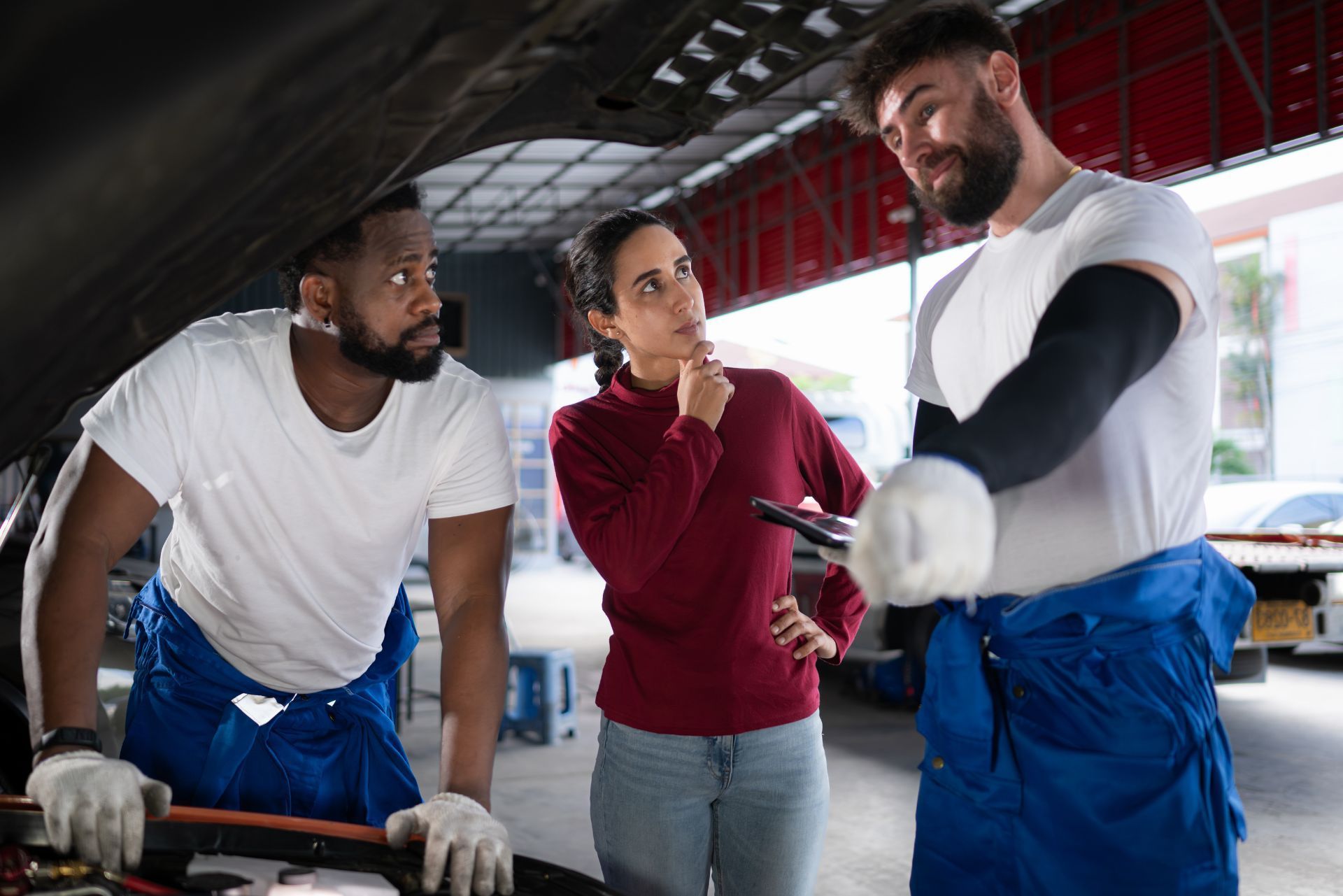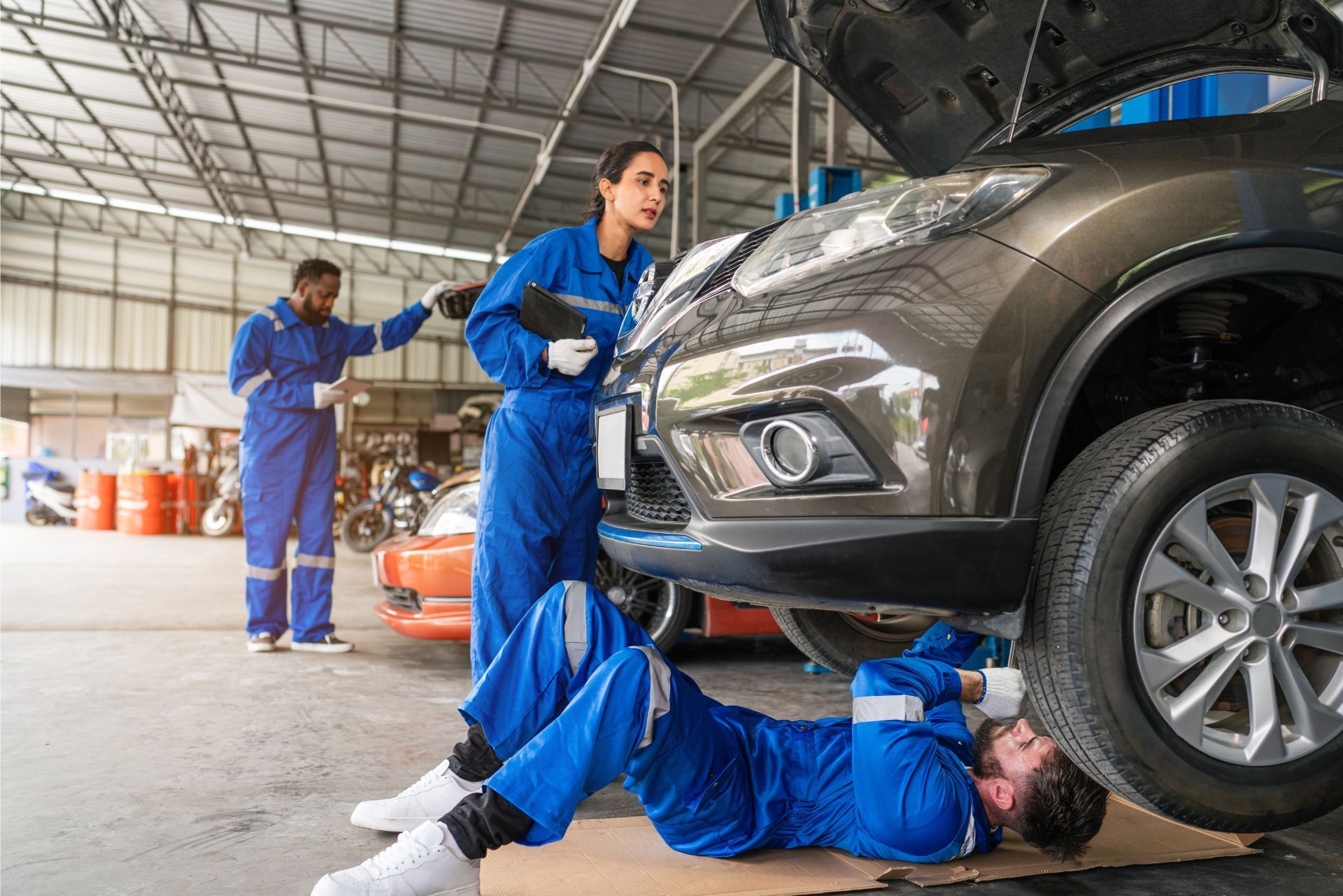Top 3 Recommended Policies

By: Lance Hale
Licensed Commercial Insurance Specialist
425-320-4280
From modest two-bay repair shops in Yakima to multi-acre dealerships lining I-5, Washington’s automotive businesses share one common reality: a single accident can threaten years of hard work. Garage liability insurance is the financial backbone that keeps the state’s repairers, towing services, detailers, and dealers on the road after a lawsuit or unexpected loss. The following guide unpacks how the coverage works, why it matters in the Evergreen State, and what to consider when buying or renewing a policy.
Understanding Garage Liability Insurance
Garage liability insurance combines elements of a commercial auto policy with general liability protection, tailored specifically for enterprises that repair, service, store, or sell vehicles. It pays legal defense costs, settlements, and judgments when a customer or third party claims bodily injury or property damage arising out of garage operations. That broad operational wording is essential because an automotive business can be sued for everything from a slip on an oil-slick floor to a test-drive collision.
Unlike garagekeepers coverage, which addresses damage to customers’ autos in the shop’s care, garage liability focuses on the business’s legal responsibility for events connected to its day-to-day activities. For Washington owners, distinguishing between the two policies helps prevent costly coverage gaps that only become apparent after a claim.
Furthermore, garage liability insurance is not just a safeguard against physical incidents; it also protects against reputational harm. In today's digital age, a single negative review or a viral social media post can significantly impact a business's reputation. If a customer claims they were injured due to negligence, the financial implications can extend beyond legal fees to include damage control and public relations efforts. Therefore, having robust garage liability insurance can provide peace of mind, allowing business owners to focus on their operations without the constant worry of potential lawsuits looming over them.
Additionally, the specifics of garage liability insurance can vary widely based on the nature of the business. For instance, a small auto repair shop may have different coverage needs compared to a large dealership that offers test drives and vehicle sales. Factors such as the number of employees, the volume of customers, and the types of services offered all play a critical role in determining the appropriate level of coverage. Business owners should work closely with insurance professionals to tailor their policies, ensuring they are adequately protected against the unique risks associated with their operations.

Unique Risks Facing Washington Auto Businesses
Washington’s geography ranges from the rainy Puget Sound to the arid eastern plateau, and that variety shapes garage risks. Western counties see a high frequency of slick-surface slips and electrical fires due to persistent humidity. Eastern counties wrestle with dust-laden air that can accelerate shop-equipment wear and invite combustion hazards. Statewide, the steady growth in EV ownership—up 52% year-over-year according to the Department of Licensing—adds fresh liability exposures tied to battery handling and high-voltage repairs. The influx of electric vehicles not only requires specialized training for technicians but also necessitates the implementation of stringent safety protocols to mitigate risks associated with battery fires and chemical leaks. As the technology evolves, auto businesses must stay abreast of the latest safety standards and manufacturer guidelines to ensure compliance and protect their employees.
The state’s legal climate also matters. Washington follows a pure comparative fault rule, meaning a claimant can recover damages even if 99% responsible for an accident. Because legal costs rise quickly when multiple parties share fault, garages must carry sufficient liability limits to avoid paying out of pocket once policy limits are exhausted. This legal framework can lead to complex litigation scenarios, especially in cases involving multiple vehicles or parties. Auto businesses must not only invest in robust insurance coverage but also consider proactive measures such as comprehensive employee training and regular safety audits to minimize the likelihood of accidents and subsequent claims. Additionally, the rise of social media has made it easier for dissatisfied customers to voice their grievances publicly, which can further complicate reputational risks for auto businesses in an already challenging legal landscape.
What Does a Standard Garage Liability Policy Cover?
While every carrier’s form varies, most garage liability contracts sold in Washington revolve around several core protections that activate when the business is found negligent.
Bodily Injury Liability
This section covers medical bills, lost wages, pain-and-suffering awards, and legal defense when someone is physically harmed by an act arising from garage operations. If a customer trips over an air hose or a test-drive ends in a collision, the insurer defends the suit and pays covered damages up to the policy limit. Additionally, it is important to note that this coverage extends to employees as well, protecting the garage from potential claims resulting from workplace accidents. For instance, if a mechanic slips and falls while working on a vehicle, the bodily injury liability can help cover their medical expenses and lost income, ensuring that the garage is not financially burdened by such incidents.
Property Damage Liability
Property damage liability responds when the garage’s actions inadvertently harm another person’s tangible property. A technician who topples a display car into an adjacent vehicle, or a service truck that dents a client’s fence during pick-up, triggers this coverage. It does not, however, pay for damage to vehicles left for service; that is the realm of garagekeepers insurance. Furthermore, this coverage can also extend to damage caused by employees while performing their duties off-site, such as during a roadside assistance call. This aspect emphasizes the importance of having comprehensive property damage protection, as it safeguards the business against unforeseen accidents that can lead to significant financial repercussions.
Products and Completed Operations
After the car leaves the lot, the risk does not disappear. Products and completed operations liability applies to accidents alleged to result from parts the business sold or repairs it completed. An improperly torqued wheel that detaches on I-90 months later can lead to a lawsuit naming the original shop, highlighting why this coverage is indispensable. This type of liability is particularly critical in an industry where the quality of parts and workmanship can have serious implications for safety. For example, if a faulty brake component sold by the garage leads to an accident, the garage could be held liable for damages and injuries sustained, making this coverage a vital part of risk management for any garage operation. Moreover, it often includes legal defense costs, which can be substantial, thereby providing an additional layer of financial security for the business.
Common Gaps and Optional Endorsements in Washington
Even a robust base policy can leave Washington garages exposed. Optional endorsements plug holes that often surface only after an incident, so understanding these add-ons is critical.
Garagekeepers Legal Liability
When customers hand over their keys, the shop assumes a “bailee” responsibility for the vehicle. Garagekeepers legal liability pays for fire, theft, vandalism, or collision damage to customers’ cars while in the company’s custody. Without it, a shop could be forced to reimburse owners directly, which can cripple cash flow if multiple vehicles are lost in a single event such as a structure fire.
Dealers Physical Damage
Dealerships typically maintain dozens—or hundreds—of owned units on display. Dealers physical damage insurance covers the inventory for weather, theft, or collision losses. Windstorms funneling through the Columbia Gorge, ice storms in Spokane, and hail in Wenatchee have all inflicted multimillion-dollar losses on dealer lots in recent years.
Pollution Liability Endorsement
Washington’s Department of Ecology enforces strict regulations on hazardous waste. A ruptured used-oil tank or coolant spill can contaminate soil, and clean-up costs are excluded in most standard liability forms. Pollution endorsements absorb both remediation expenses and third-party bodily-injury suits stemming from environmental incidents.
How Much Does Garage Liability Insurance Cost in Washington?
Premiums fluctuate widely, but statewide averages compiled by the Office of the Insurance Commissioner suggest a small repair shop with one location and $1 million/$2 million limits pays between $2,700 and $6,000 annually. A franchised dealership with hundreds of test-drive plates can easily exceed $40,000, especially when adding dealers physical damage and umbrella limits.
Because carriers weigh numerous variables, two seemingly identical businesses may see different quotes. Loss history, employee driving records, county crime rates, and even the proximity to wildland-urban interfaces feed into proprietary rating algorithms.
Factors that Influence Premiums
Key cost drivers include revenue, payroll, number of plates, prior claims, average vehicle values in care, and whether the operation performs high-risk work such as performance tuning. Businesses that store EV batteries overnight may also pay a surcharge because lithium-ion fire suppression is complex and equipment is expensive.
Sample Rate Ranges
A Bremerton marine-engine mechanic might secure $1 million in liability for under $3,000 per year, while a Seattle luxury-brand dealer opting for a $5 million umbrella and open-lot hail coverage could surpass $60,000. Those ranges underscore why benchmarking against statewide averages is only a starting point; individualized underwriting ultimately determines the final figure.
Regulatory Landscape and State Requirements
Washington does not mandate garage liability at the state level, but numerous municipal business licenses and dealer licensing rules effectively require proof of insurance. For example, the Department of Licensing obliges motor-vehicle dealers to demonstrate “financial responsibility,” and a garage liability certificate is the most straightforward way to comply.
Additionally, any company with employees must carry workers’ compensation through the state fund, and commercial auto coverage is compulsory for titled service vehicles. Coordinating these policies prevents overlaps and ensures exclusions in one form are not mistakenly assumed covered elsewhere.
Best Practices for Reducing Claims and Premiums
While paying premiums is unavoidable, proactive risk management can shrink loss frequency, stabilize pricing, and even yield dividends in the form of carrier loss-control rebates. Many Washington garages have shaved double-digit percentages from renewals by implementing simple operational tweaks.
Strategic improvements range from fortifying physical security to tightening paperwork. Below are three focus areas insurers consistently reward.
Employee Training and Certification
Insurers scrutinize who turns the wrenches. Mechanics who maintain ASE or factory certifications and complete documented safety refreshers are statistically less likely to make errors that spark claims. Presenting carriers with a structured training log often triggers preferred-tier rating credits.
Facility Safety and Housekeeping
Slips, trips, and falls remain the top source of small bodily-injury claims. Installing non-skid mats, marking walking lanes, and scheduling daily spill checks reduce incidents and provide tangible evidence of due diligence if litigation arises.
Contractual Risk Transfer
Shops that partner with towing vendors, detailers, or subcontracted diagnostics techs should require signed hold-harmless agreements and certificates of insurance. Shifting certain liabilities downstream prevents the garage’s policy from responding to an incident it did not directly cause.

Claim Scenarios: Real-World Examples from Washington
The following true-to-life incidents illustrate how garage liability responds—and what the financial stakes can be when coverage is insufficient.
Slip and Fall in a Service Bay
An Olympia customer retrieving her SUV stepped on a puddle of coolant and fractured her wrist. Medical bills and pain-and-suffering demands totaled $78,000. The shop’s $1 million per-occurrence limit covered the settlement, but legal defense consumed $19,000, demonstrating why including defense costs outside the limit is valuable.
Faulty Brake Repair Accident
A Spokane repair facility incorrectly installed brake pads. Two weeks later, the customer rear-ended a city bus, injuring four passengers. Suits alleged negligent repair, and total claims reached $410,000. Products and completed operations coverage under the garage liability form settled the matter, sparing the business owner personal bankruptcy.
Wildfire Smoke Damage to Customer Cars
During an Eastern Washington wildfire, heavy smoke infiltrated a dealership’s service building, leaving 18 customer vehicles with interior odor and electronic corrosion. Because the damages occurred while cars were in the dealer’s care, garagekeepers legal liability, not garage liability, paid the $92,000 tab for detailing and component replacement.
Choosing the Right Insurer and Policy Limits
The Washington market features national brands and regional mutuals that specialize in automotive risks. While price naturally draws attention, breadth of coverage and claims service often determine long-term satisfaction. Interview multiple agents to gauge their familiarity with Washington-specific exposures, such as earthquake sprinkler-leak endorsements for shops in the Cascadia subduction zone.
When selecting limits, consider worst-case scenarios. If a multi-vehicle accident on Highway 2 involves a courtesy shuttle, seven-figure settlements are realistic. Umbrella or excess policies layering an additional $1 million to $5 million over the base garage liability are common among larger operations.
Questions to Ask a Broker
Key talking points include whether defense costs erode the liability limit, the carrier’s A.M. Best financial strength rating, deductible options, and policy territory (some forms exclude incidents occurring more than 50 miles from premises unless endorsed).
Reading the Fine Print
Exclusions such as “designated operations,” which remove coverage for activities like mold remediation or performance tuning, can be buried deep in endorsements. Thoroughly reviewing specimen policies before binding prevents unpleasant surprises when a claim adjuster points to language that negates coverage.
Frequently Asked Questions
Even seasoned operators grapple with nuanced insurance terminology. The following clarifications address common points of confusion voiced by Washington garage owners.
Is garage liability the same as general liability?
No. General liability covers premises-related exposures for most businesses but omits auto-related hazards. Garage liability extends that premise coverage while adding protection for test drives, customer vehicles, and auto sales operations, making it the more comprehensive option for automotive enterprises.
Do Washington dealerships need both garage liability and garagekeepers insurance?
Yes. Garage liability protects against third-party bodily injury and property damage, whereas garagekeepers covers physical damage to customers’ vehicles in your custody. Dealerships offering service must carry both to shield against the full spectrum of risks.
What happens if I hire subcontractors?
Most garage liability policies exclude independent contractors unless explicitly scheduled. Require subcontractors to carry their own liability limits equal to yours and list your business as an additional insured; otherwise, your policy could be forced to respond, potentially raising future premiums.
Final Thoughts
Garage liability insurance may feel like a line-item expense, yet it is the safety net that lets Washington’s automotive entrepreneurs innovate, expand, and serve customers with confidence. By understanding policy mechanics, evaluating endorsements, and investing in loss-control best practices, owners can secure robust protection without overpaying. The road ahead is unpredictable, but with the right coverage in place, a single misstep need not derail the journey.

